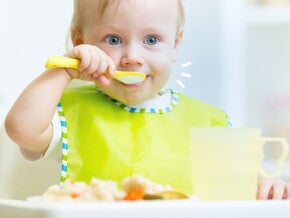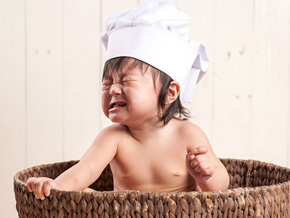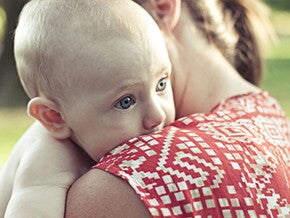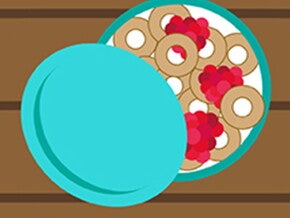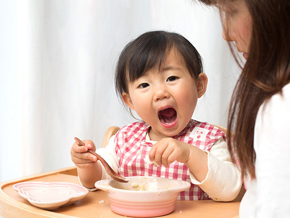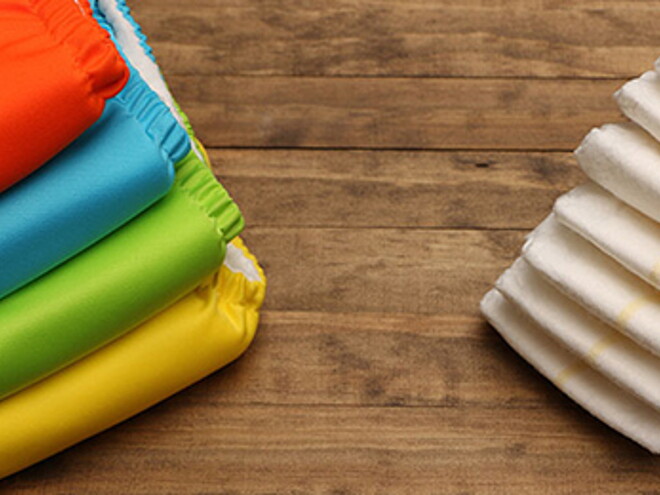
Basically, what goes in one end will determine what comes out the other! That means there is likely to be slight differences in poo between babies depending on their age and what food or milk is being ingested (breast, infant formula, solids or a combination). It is important to know what to expect in a nappy so you can then know when your baby’s poo is abnormal and may need healthcare professional advice.
Normal Baby Poo
- Your baby’s very first bowel movement arrives in the first 24 hours and is called meconium. It is greenish-black, thick and sticky and consists of all the intestinal substances that an unborn fetus ingests while in the womb – epithelial cells, lanugo, mucus, amniotic fluid, bile and water.
- If your baby is breastfed, their poo will change into a more yellowish mustard colour (sometimes greenish or orange). It is a soft consistency and often unformed, with a sweet smell, and can occur at every nappy change or less often as the digestive system matures. Breast fed babies don’t usually suffer from constipation unless there is an underlying health problem, consult your health care professional if you are concerned. If there is any jaundice (not uncommon in the early days and is characterized by yellow skin) poo could be pale until the jaundice is gone.
- If your baby is formula fed, their poo is generally firmer and may vary in colour ranging from yellow, green or brown depending on which type of formula they are on. They will be slightly more pungent smelling and frequency of poo’s may vary from several times per day to once per week depending on your baby and the type of formula they are on.
A baby’s poo is affected by a number of factors and the colour and consistency can change with many situations including;
- Fluid intake
- Introduction of solids
- Age (as the age increases the stool characteristics change)
- Mixed feeding, or transiting from breastfeeding to formula or between formulas
If you are aware of what normal baby poo looks like, you will then know when something is not normal and may need further attention. Baby poo that is black (apart from their first poo), red or white always indicates the need for further assessment by a healthcare professional.
Constipated Baby
While we all know the definition of constipation for adults, it is important to be aware that the definition is slightly different for our little ones. While infrequent bowel motions may be an indication of constipation, it is not always the case in babies. Constipation in babies is more frequently defined as passing hard, dry (like small pellets) poo. Your baby may go red, grunt or cry during pooing but this doesn’t mean they are constipated, they may just be getting used to pooing and usually grow out of this. If your baby is fed formula milk, generally poo is thicker and pastier and sometimes less frequent than breast-fed poo but this doesn’t mean your baby has constipation.
Possible causes of constipation in babies
- Not enough fluid intake over the day. This may be due to illness, not enough feeds over the day, or hot weather causing fluid loss through sweat.
- Incorrect milk preparation. Incorrect ratios of powder and water may affect bowel habits.
- Changes to baby’s daily routine may impact on your babies eating patterns and fluid intake and in turn will affect their bowel habits. This may be due to changes in appetite or simply the logistics of fitting everything into a new routine.
- Introducing solids may lead to bowel changes. This does not happen in every case but is quite normal and can take some babies longer to adjust.
- Toilet training may have a big impact on bowel habits. As your little one is becoming more aware of their bowel movements you may find their toilet habits change. It is not uncommon for babies to hold on for prolonged periods if they aren’t completely comfortable with going to the toilet just yet. If this is the case, wait a few weeks or months before trying again. It takes time to master a new skill – there’s no rush.
What you can do to help:
- Ensure adequate fluid intake over the day, this could be in the form of extra breastfeeds or offering cool boiled water to drink between feeds, particularly in hot weather;
- When your baby starts solids, they may need extra fluid, through extra breastfeeds or offering cooled boiled water to drink between meals;
- If your baby is formula fed, always follow the preparation instructions on the pack, and use the scoop provided.
- If there are any major changes to your baby’s normal routine, take extra notice of their appetite, extra cuddles and one-on-one play time may be needed to help them feel more settled in their new routine, which will help their appetite return.
- Constipation can be reduced by increasing fruit and vegetables in your baby’s diet.
- If you feel your baby is not ready for toilet training and it’s affecting their bowel habits, wait a few weeks or months before trying again. It takes time to master a new skill – there’s no rush.
- Before using any form of medication for your baby (e.g. Oral laxatives or suppositories), always consult a medical professional.
- Gentle massage strokes below your baby’s belly button in a clockwise direction
- Give your baby plenty of opportunities for tummy time, extra mobility will help get the bowels moving too.
- Treatment from a specialized physiotherapist, osteopath or chiropractor may be able to help regulate bowel movements.
Often simple and effective treatments will usually get your baby’s bowel movements running like clockwork again in no time. Bear in mind that some babies (and adults, for that matter) are naturally more susceptible to constipation than others.
If the constipation is accompanied by any of the following symptoms, don’t hesitate to seek medical advice. Early intervention is always the best:
- Your baby’s stool contains blood;
- Your baby is in pain when passing a stool;
- Your baby is irritable
- Your baby has abdominal pain
Diarrhoea in Baby
Diarrhoea is characterized by very frequent, liquid stools. Diarrhoea results in a significant loss of water and mineral salts and therefore presents a serious risk of dehydration. In extreme cases, it can even result in your baby having to be hospitalized to receive fluids so diarrhoea must be taken seriously.
Possible Causes of Diarrhoea in Babies:
- Illness including a viral or bacterial infection
- Lactose Intolerance following gastro
- Giardia (parasite infection)
- Coeliac Disease
- Irritable Bowel Syndrome in older children
What you can do to help:
- Consult your health care professional for the best option for you and your baby. They might recommend to rehydrate your baby by:
o Extra breastfeeds
o Additional cooled boiled water feeds
o Using an oral rehydration solution.
- If your baby has temporary lactose intolerance after a bout of diarrhea, if your baby is breast fed, continue to do so and offer extra oral rehydration fluids between feeds. If your baby is formula fed, your health care professional may recommend a special formula for lactose intolerance.
o If your baby has started to eat solids you can provide food at the same time as oral rehydration. It is best to start with bland foods like plain biscuits, bread, rice or potato. It is always advisable to add other foods slowly back into your baby’s diet.
o Don’t forget to wash your hands regularly and whenever you change your baby’s nappy, as some forms of diarrhoea are contagious.
If the diarrhoea is accompanied by any of the following symptoms, don’t hesitate to seek medical advice. Early intervention is always the best:
- Your baby vomits whenever you give food or drink;
- Your baby’s vomit is green;
- Your baby’s mouth is dry;
- Your baby is passing watery poo every hour or two;
- Your baby’s stool contains blood;
- Your baby is drowsy or unresponsive;
- Your baby looks tired with pale grey looking skin and sunken eyes;
- Your baby is not passing urine (a sign of dehydration);
- Your baby has lost weight;
- Your child has bad stomach pain.






